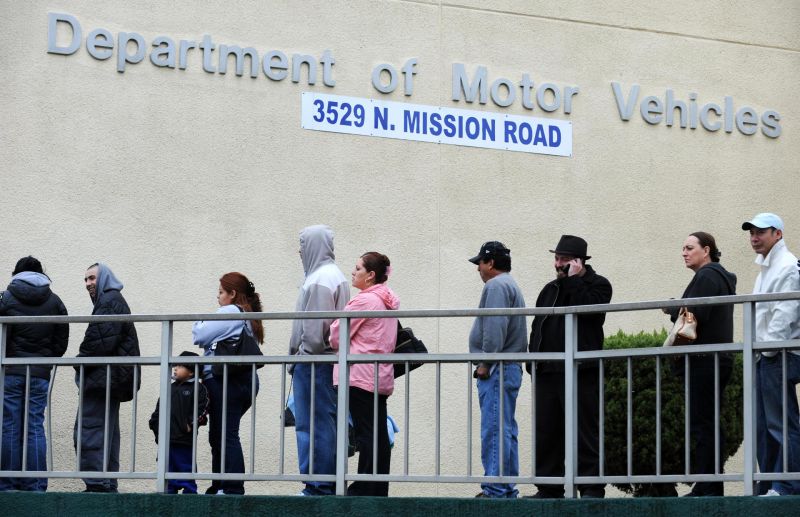Gov. Jerry Brown has characterized the traffic court system as a "hellhole of desperation" for the poor. In California and other states, the courts use license suspensions as a way to pressure drivers to pay for tickets and related court fees, which can snowball into hundreds of dollars for minor infractions such as driving with a broken taillight or alone in a carpool lane.
The bill that the Legislature sent to Brown last week focuses on expediting how the state's temporary traffic amnesty program works, by requiring courts to decide amnesty claims within 90 days, and to process all claims filed by March 31, 2017, when that program ends.
Under the amnesty, low-income drivers with minor violations before 2013 can get their traffic debt reduced up to 80 percent and can get their driver's licenses reinstated. Motorists with infractions after 2013 do not qualify for traffic debt reduction, but they may still recover a suspended license if they sign up for a payment plan.
The current SB 881 comes in response to some courts taking too long to respond to amnesty applications, said state Sen. Robert Hertzberg (D-Van Nuys), who authored that bill and SB 405, which helped establish the traffic amnesty program in October 2015.
"The response to the traffic amnesty has been astounding -- more than 100,000 Californians struggling to make ends meet have been able to get fine and fee reductions and move on with their lives," said Hertzberg. "Unfortunately, many others have been left in the lurch because some courts are so slow to process these claims. SB 881 rectifies this problem."
The Judicial Council of California, which sets policy for the statewide court system, reports that close to 133,000 accounts have been resolved in the first seven months of the program, resulting in $18.8 million of revenue.
But many others could receive relief, as the council estimates more than 4.9 million accounts are eligible for amnesty, worth about $4 billion.
The Judicial Council does not oppose the current version of SB 881, said spokeswoman Natasha Payes.
The initial version of the bill aimed at bigger changes in the judiciary process. The bill would have stopped the Department of Motor Vehicles from revoking the license of drivers who fail to pay or to appear in court for minor traffic infractions. It would also have allowed the DMV to restore the license of motorists with unpaid traffic tickets for minor violations.
When the California courts notify the DMV of two or more violations for failure to pay or to appear in court, the DMV suspends the driver’s license.
Hertzberg said local judges, and the Brown administration to some extent, were concerned that the state could lose millions of dollars in revenue if more drivers didn't pay traffic debt because they no longer feared losing their license.
"It was really the rank-and-file judges, and I've talked to many of them, who were afraid they'd lose money," said Hertzberg. "The administration is taking a cautions approach. They like the idea of the bill but want to do a drill down on the numbers."
Hertzberg said he intends next year to continue his effort to decouple license suspensions from failure to pay traffic tickets. He ultimate hopes to reduce the "excessive" cost of traffic tickets and related court fees in California, he said.
Issue Not Over, Say Advocates
In California, uncollected court-ordered debt for traffic and criminal offenses adds up to an estimated $10.2 billion, according to the Legislative Analyst’s Office.
A long-term solution is needed to address the disproportionate impact of license suspensions on low-income black and Latino drivers in the state, said Mike Herald, policy advocate with the Western Center on Law & Poverty, one of the organizations co-sponsoring SB 881.
"This issue is not over because starting April next year, there’s no longer a remedy for these people to get their licenses back," said Herald, referring to the end of the traffic amnesty program. "A lot of people’s lives are going to get disrupted and harmed because they don’t have a way to get out of this problem."
The Western Center on Law & Poverty filed a lawsuit against Los Angeles Superior Court in August over the basic policy of suspending driver's licenses "simply because people are poor," said Herald, who added that other courts throughout the state are facing similar lawsuits.
'I Would Be In A Home, If I Had A Driver's License'
Still, SB 881 could help drivers like Megan Williams in San Jose recover her license a bit sooner.
Williams said her license was suspended after she could not pay an initial traffic ticket of $490 for driving alone in a carpool lane, which she disputed unsuccessfully. A Santa Clara Superior Court judge agreed to reduce the fine to $315, but she still couldn't afford it, she said.
"I specifically told them I just lost my job, I don't have any income right now," said Williams, who is currently living in a shelter with her two children and looking for employment to secure stable housing.
Since she missed the court's payment deadlines, her license was revoked and her traffic debt increased to about $770, said Williams.
She was hopeful that applying for traffic amnesty could help her regain her license this month, but she heard from the Santa Clara County Department of Revenue that it would take about four months to process her claim, she said.
In the meantime, she is unable to land jobs that require a valid driver's license. She recently had to turn down an offer doing deliveries.
"I would have that and be working right now. I would be in a home, stabilized me and my boys, if I had a driver's license," Williams said.
